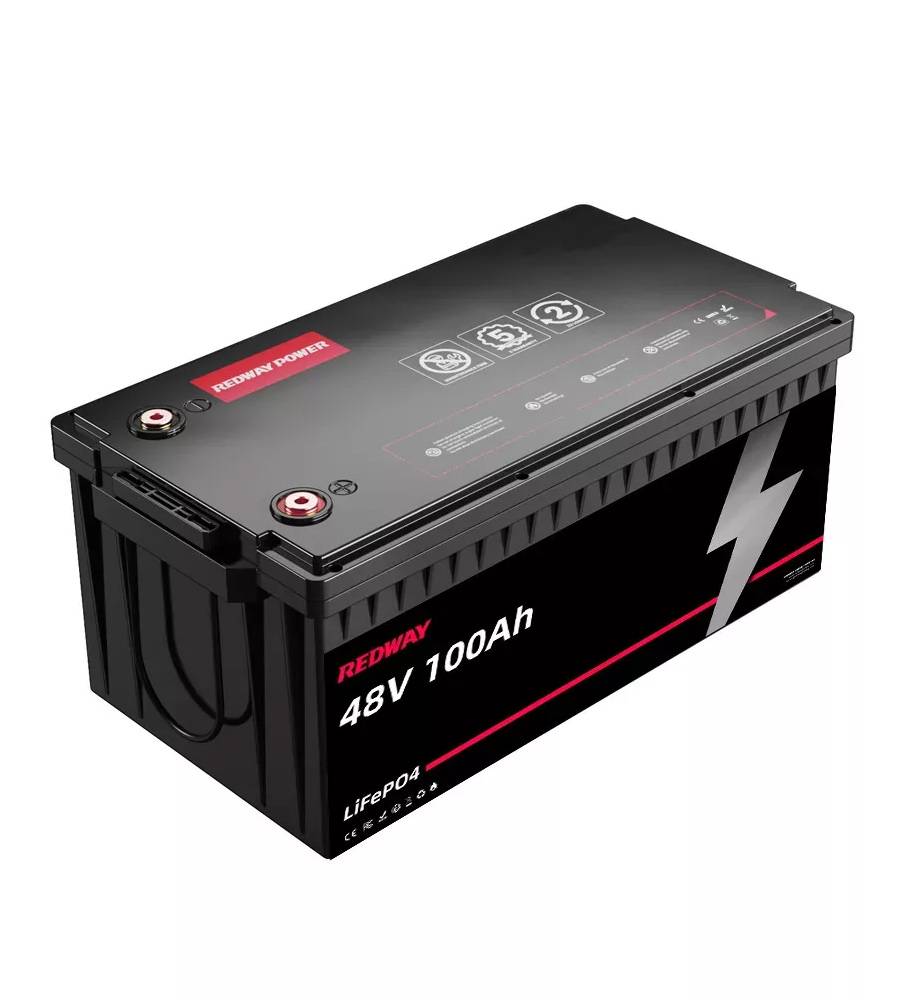-
Home
- About Liduo
- Product Center
- RV lithium battery
- Forklift lithium battery
- Wall mounted lithium battery
- Golf cart lithium battery
- Server rack battery
- lithium iron phosphate battery
- Solution
-
Portable battery
-
Power battery
-
Energy storage battery
-
Server battery
-
Special batteries
-
Household energy storage
- OEM Services
- R&D
- News

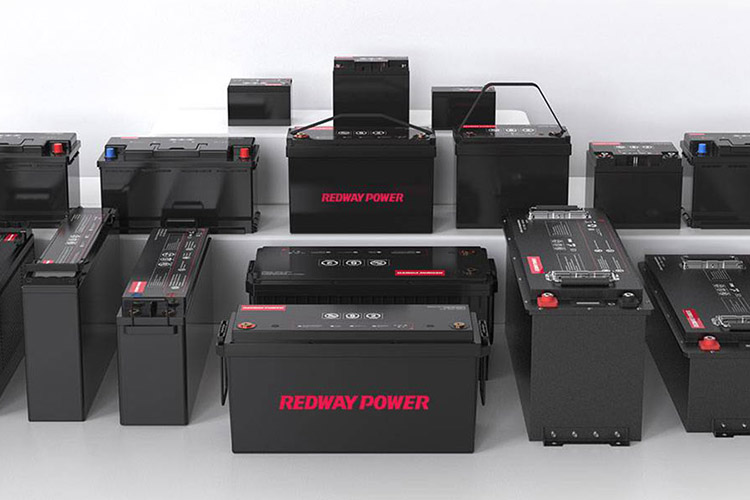 PRODUCT CENTER
PRODUCT CENTER48V (51.2V) 100Ah Lithium Battery 8D
- Type:48V RV lithium battery
- Code:

-
Lithium battery Lithium iron phosphate (LFP)
Rated voltage 51.2V
Nominal capacity 100Ah
Nominal energy 5376Wh
Dimensions (L * W * H) 523 x 269 x 218 mm / 20.6 x 10.6 x 8.6 in / 8D
Weight 39 kg / 86 lb
IP level IP65 (More request)
- Product Description
This battery is the 48V (51.2V) 100Ah Lithium Battery 8D from Redway Power, a renowned manufacturer based in China specializing in high-quality lithium-ion batteries. Engineered with advanced LiFePO4 technology, this battery provides reliable energy solutions for various applications, ensuring exceptional performance and safety.
Key Features
· High Energy Capacity: With a nominal capacity of 100Ah and an energy output of 5,376Wh, this battery is ideal for powering demanding devices and systems.
· Long Cycle Life: Designed to last over 4,000 cycles at 80% depth of discharge (DOD), it significantly reduces the need for frequent replacements.
· Durable Construction: The battery features an IP65 rating, which protects against dust and water ingress, making it suitable for challenging environments.
· Smart Battery Management System (BMS): Equipped with an intelligent BMS that safeguards against overcharging, overheating, and short circuits, ensuring safe operation.
· Customizable Options: As an OEM provider, Redway Power offers tailored solutions to meet specific customer requirements, including dimensions and additional functionalities.
Applications
The 48V 100Ah Lithium Battery 8D is perfect for a variety of applications, including:
· Electric scooters
· E-rickshaws and e-trishaws
· E-motorcycles
· Automated Guided Vehicles (AGVs)
· Floor cleaning machines
With a charge voltage of 58.4V and a discharge voltage of 40V, this battery is optimized for various operational needs. It operates effectively across a temperature range from -20°C to 65°C, making it versatile enough for different industrial settings.The lightweight design of the battery facilitates easy installation and integration into existing systems while ensuring that your equipment operates efficiently throughout the day. Additionally, the battery supports fast charging capabilities, allowing for quicker turnaround times between uses.
As a trusted factory in China, Redway Power is committed to delivering high-quality lithium-ion batteries that enhance productivity and sustainability in your operations. The 48V (51.2V) 100Ah Lithium Battery 8D not only reduces downtime but also contributes to lower operational costs due to its efficiency and long lifespan.Investing in this battery means choosing a reliable power solution that meets the demands of modern electric vehicles and industrial applications while supporting your business’s growth and sustainability goals. Choose Redway Power for your lithium battery needs and experience unparalleled performance and service.
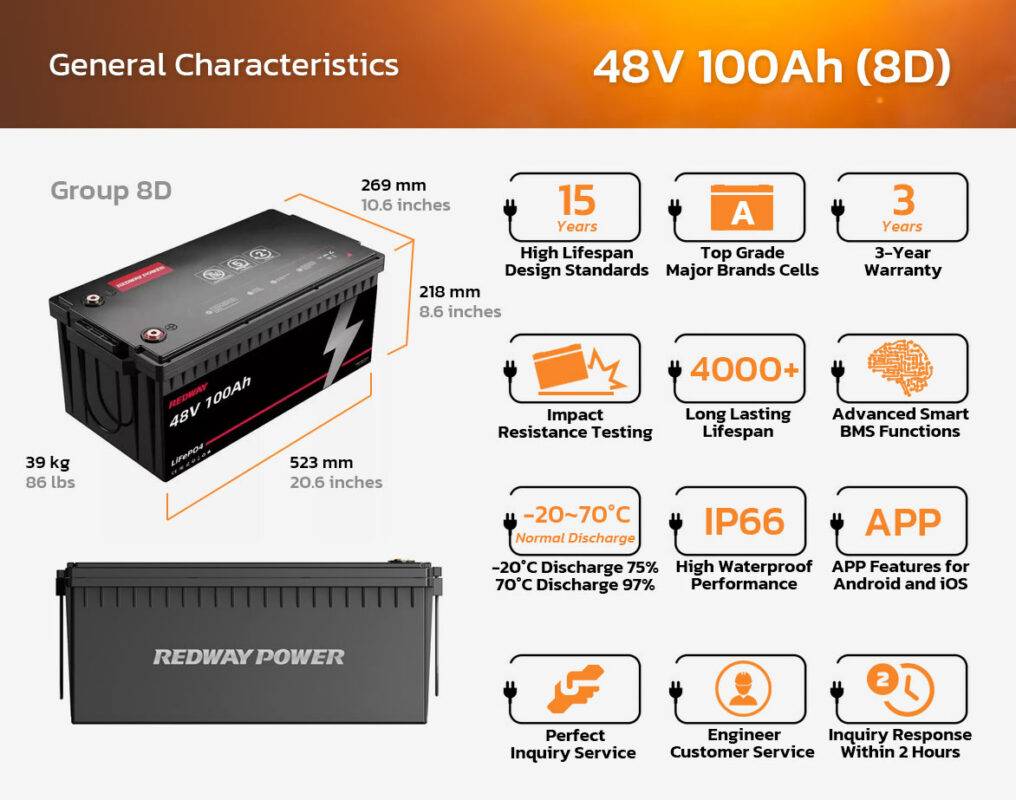
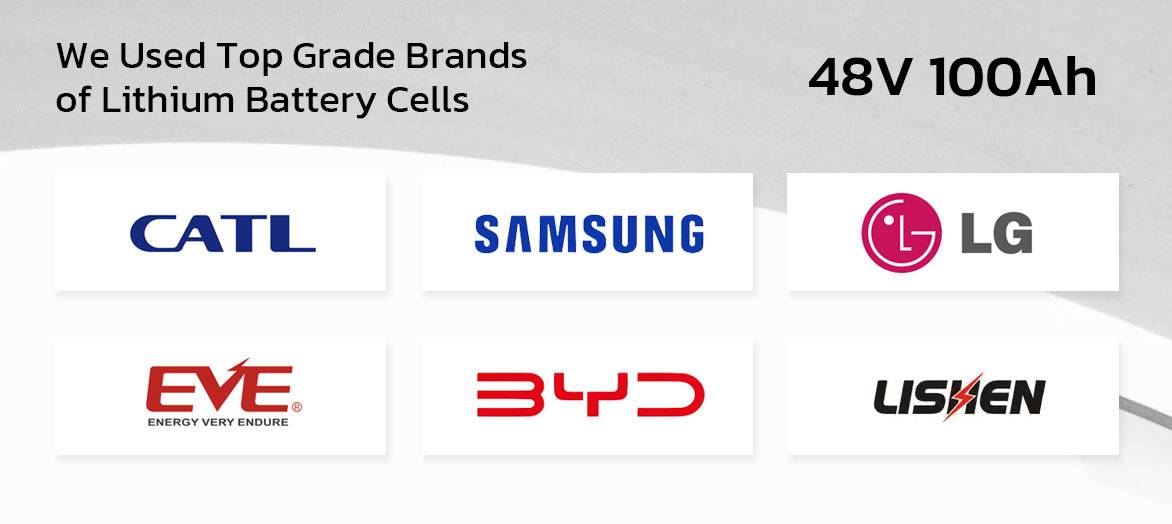
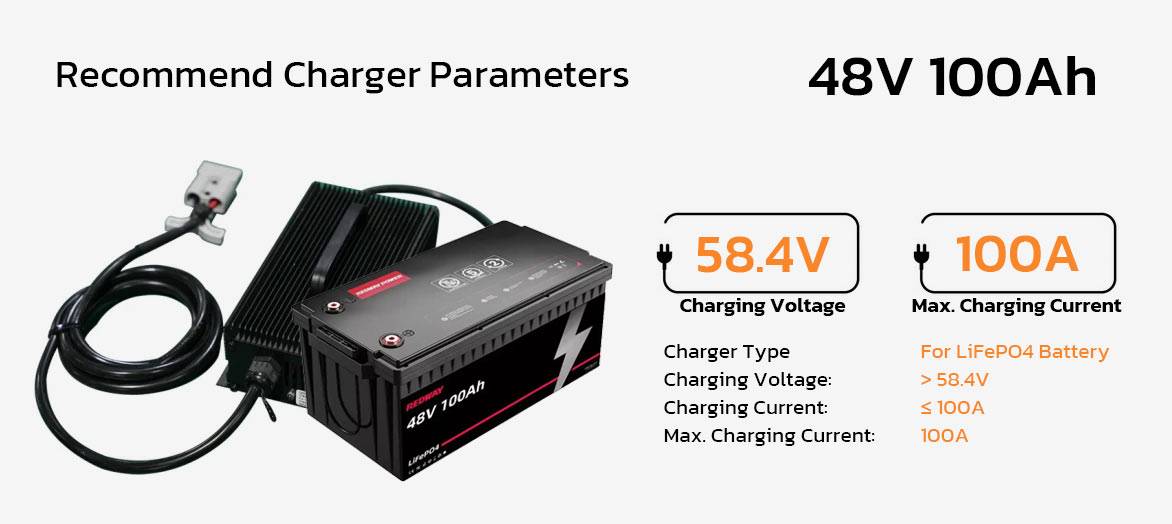
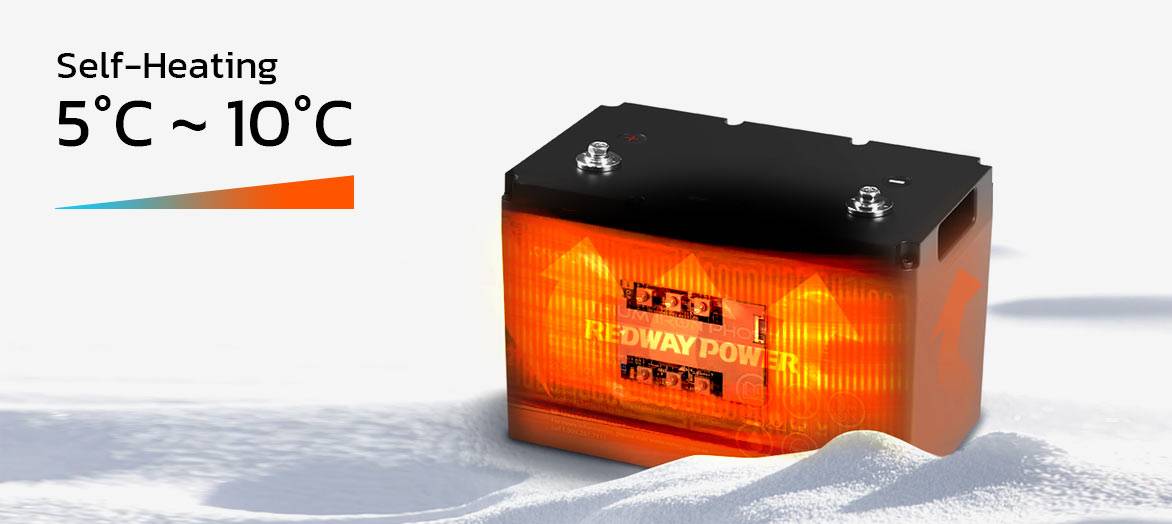
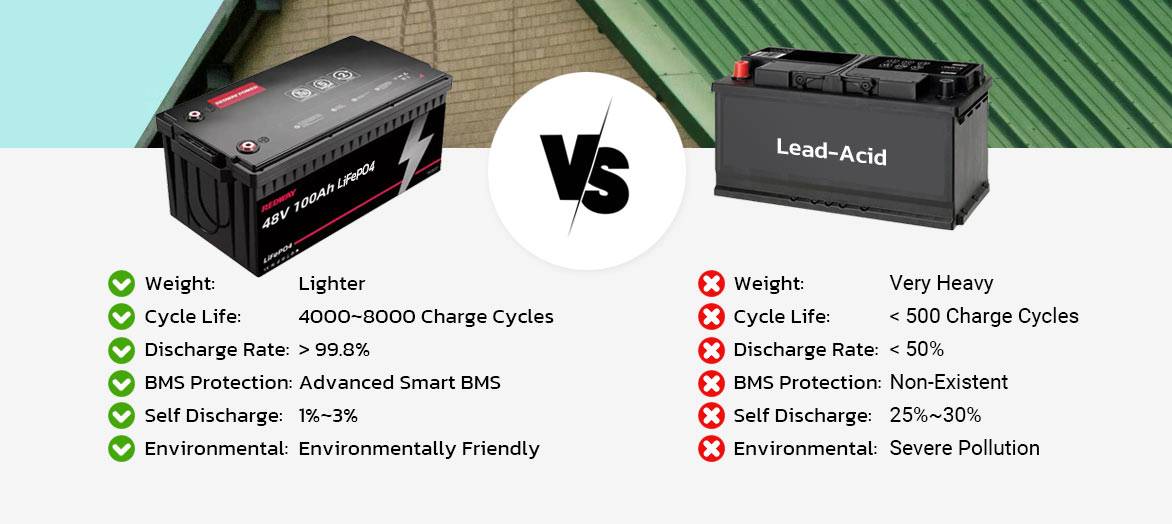
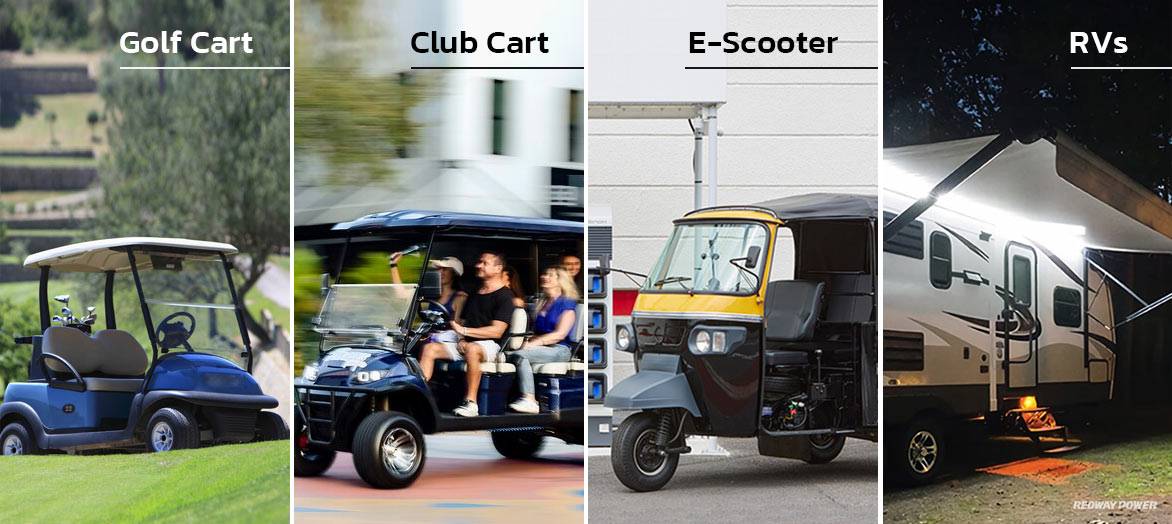
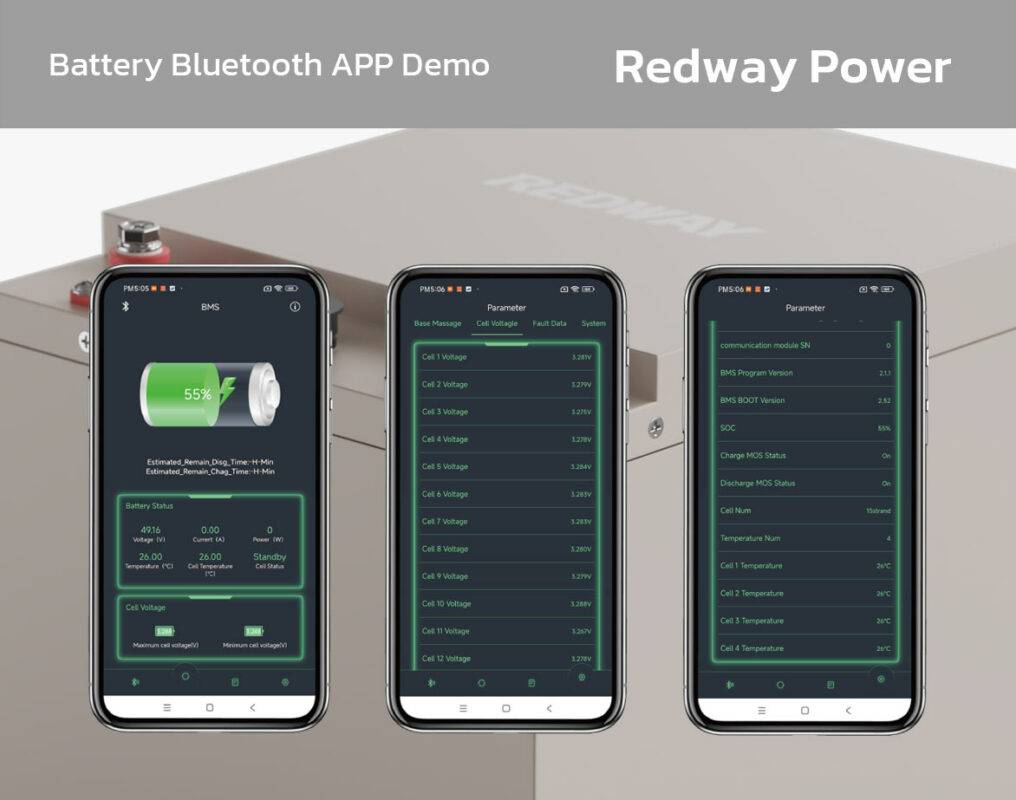
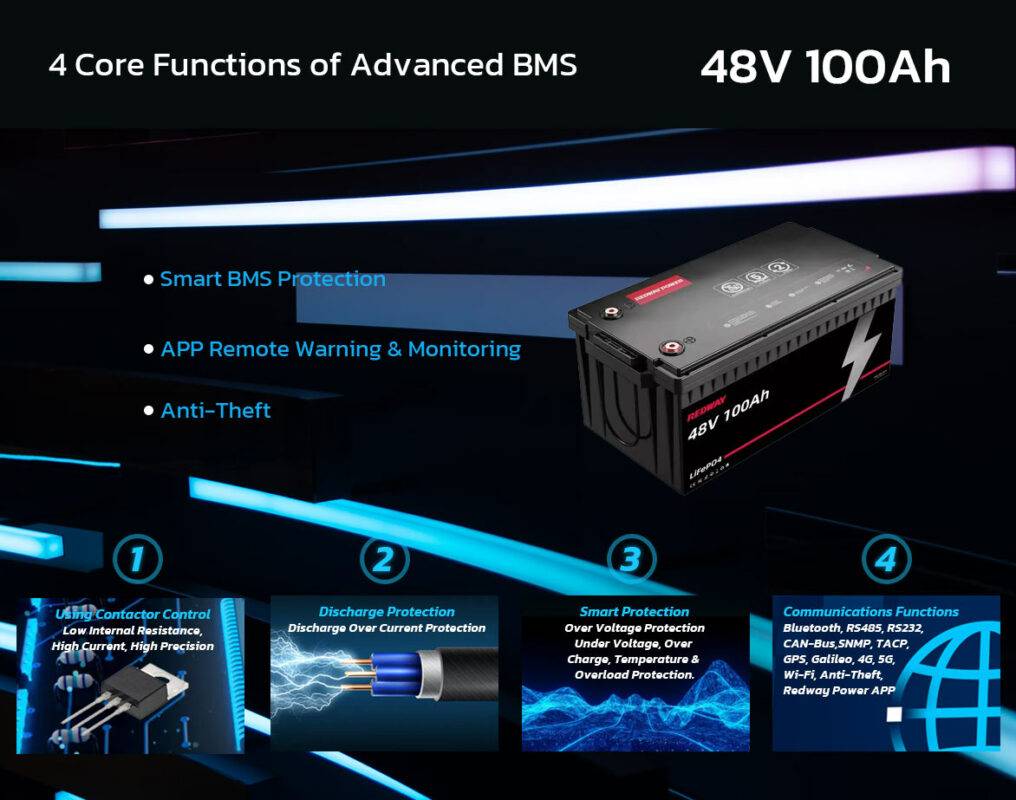
48V 100Ah Specifications Cell Type LiFePO4 Nominal Voltage 51.2V Nominal Capacity 105Ah Nominal Energy 5376Wh Charge Voltage 58.4V Discharge Voltage 40V Max. Continues Charge Current 100A Max. Continues Discharge Current 100A Dimensions
[L x W x H]523 x 269 x 218 mm
20.6 x 10.6 x 8.6 in
8DWeight 39 kg
86 lbIP Rating IP65 (More request) Series & Parallel 16S1P Max. Battery Parallel 4P to 21.5kWh (More request) Internal Resistance ≤30mΩ Cycle Life >4000 cycles (DOD 80%) Self-Discharge 3% (Per month) Charge Temperature 0°C ~ 60°C
32°F ~ 140°FDischarge Temperature -20°C ~ 65°C
-4°F ~ 149°FOptional Functions Bluetooth / WiFi / LCD / LED Touch Screen / RS485 / RS232 / CAN / 4G, 5G / GPS / APP Charger High current fast charger BMS Intelligent BMS protection Terminal M8 Bolts Battery Case ABS (Fireproof plastic) Warranty 3 Years Silk-Screen / Label Printing Yes User Manual / Warranty Card Yes Customization / OEM / ODM Yes Shipment Yes Certifications IEC, UN38.3, MSDS (More request) What is the backup time for a 48V 100Ah lithium-ion battery?
The backup time for a 48V 100Ah lithium-ion battery depends on the load. For example, if the load is 1000W, the battery can provide approximately 4.8 hours of backup time. The formula used is:
Backup Time hours =Battery Capacity Wh / Load W What is the life expectancy of a 48V battery?
The life expectancy of a 48V lithium battery typically ranges from 10 to 15 years with proper care. Lithium batteries generally offer more cycles than traditional lead-acid batteries, often lasting between 2,000 to 5,000 cycles depending on usage and maintenance.
How many batteries do I need for a 48V inverter?
To determine how many batteries you need for a 48V inverter, divide the desired total capacity by the capacity of each battery. For example, if you want 400Ah total capacity and use 100Ah batteries, you will need 4 batteries connected in series to achieve the required voltage.
Do lithium batteries need a special inverter?
Lithium batteries do not necessarily require a special inverter, but compatibility is crucial. Ensure that the inverter's voltage and charging specifications align with the lithium battery's requirements for optimal performance and safety.
What is the price of a lithium 48V 100Ah battery?
The price of a 48V 100Ah lithium battery typically ranges from $600 to $1,200, depending on the brand and features such as Battery Management Systems (BMS) and warranty options. Prices can vary based on market conditions and specific product specifications.
What is the charge of a 48V lithium battery?
A fully charged 48V lithium battery typically has a voltage range of about 54.4V to 58.4V when fully charged. The nominal voltage is around 51.2V. Regular monitoring ensures optimal performance and longevity.
How many kWh is a 48V 100Ah battery?
A 48V 100Ah battery has an energy capacity of:
kWh=Voltage×Capacity/1000=48×100/1000=4.8kWhThis means it can supply up to 4.8 kWh of energy when fully charged.
Is it better to have 2 100Ah lithium batteries or 1 200Ah lithium battery?
Having two 100Ah lithium batteries can provide flexibility in usage and redundancy, allowing for easier monitoring and maintenance. However, a single 200Ah battery may be more space-efficient and simpler to manage, depending on your system design.
Can you mix a 100Ah and 200Ah battery?
Mixing a 100Ah and a 200Ah battery is not recommended due to differences in discharge rates and charging characteristics. This can lead to uneven wear and reduced lifespan for both batteries. It's best to use batteries of the same type, capacity, and age.
What is the difference between 24V 100Ah and 12V 100Ah?
The main difference between a 24V 100Ah and a 12V 100Ah battery lies in their voltage output. The 24V battery provides higher voltage suitable for larger systems or applications requiring more power, while the 12V battery is common in smaller systems or devices with lower power requirements.
What does 8D mean in a battery?
The term 8D refers to a specific size classification for lead-acid batteries, indicating dimensions approximately 20.75 x 10.75 x 9 inches (LxWxH). These batteries are commonly used in heavy-duty applications like trucks and RVs due to their high capacity and durability.
What is the life expectancy of an 8D battery?
The life expectancy of an 8D lead-acid battery typically ranges from 3 to 7 years, depending on usage conditions, maintenance practices, and environmental factors. Proper care can extend its lifespan significantly.
What is the equivalent of an 8D battery?
An equivalent to an 8D battery would be another heavy-duty lead-acid or AGM (Absorbent Glass Mat) battery with similar dimensions and capacity (around 200-250 Ah) suitable for high-drain applications like commercial vehicles or marine use.
Is an 8D battery a deep cycle battery?
Yes, an 8D battery can be classified as a deep cycle battery if designed for that purpose. Deep cycle batteries are built to provide sustained power over long periods rather than short bursts, making them suitable for applications like RVs or solar energy systems.
What is the difference between 8D and 31 battery?
The primary differences between an 8D and a 31 battery are size and capacity. An 8D battery is larger with higher capacity (typically around 200-250 Ah) compared to a group size 31, which usually has around 70-120 Ah, making it suitable for different applications.
How much longer do lithium batteries last than regular batteries?
Lithium batteries generally last about 2 to 3 times longer than regular lead-acid batteries, offering lifespans ranging from 10 to 15 years, compared to lead-acid's typical lifespan of around 3 to 5 years, depending on usage conditions.
What voltage is 50% in a 48V battery?
For a typical 48V lithium battery, approximately half charge (50%) corresponds to about 46-47 volts. It's essential to monitor voltage levels accurately to maintain optimal performance and longevity.
Can I charge a lithium battery with a normal charger?
Charging a lithium battery with a normal charger is not recommended as it may lead to overcharging or damage. Lithium batteries require chargers specifically designed for their chemistry that manage voltage and current levels appropriately.
How do you wake up a 48V lithium battery?
To "wake up" a dormant or deeply discharged 48V lithium battery, connect it to an appropriate charger designed for lithium technology. Allow it some time on low charge settings before switching back to normal charging levels once it reaches operational voltage.
What shortens the life of lithium batteries?
Factors that shorten the life of lithium batteries include excessive heat, overcharging, deep discharging beyond recommended limits, high discharge rates, and poor quality chargers or BMS systems that fail to regulate charging properly.
Which brand of lithium battery is the best?
The best brand of lithium batteries often depends on specific needs; however, brands like Tesla, LG Chem, Battle Born, and Renogy are well-regarded for quality, performance, reliability, and customer service in various applications including residential energy storage.
When not to use lithium batteries?
Avoid using lithium batteries in extreme temperatures (both hot and cold), in applications requiring high discharge rates without proper management systems, or where weight limitations are less critical compared to other types like lead-acid batteries.
Which type of lithium battery will last the longest?
Lithium Iron Phosphate (LFP) batteries typically have the longest lifespan among lithium chemistries, often exceeding 3,000 cycles at full depth of discharge, making them ideal for applications requiring longevity such as renewable energy storage systems.
-
About Us
Company Profile History Organizational Honor -
Product Center
Forklift lithium battery Rv lithium battery Wall-mounted lithium battery Golf cart lithium battery -
Solution
Energy storage battery Power battery Server battery -
Know us
News center Contact us -
Contact us
0769-89333805 No. 78, Puxing East Road, Qingxi Town, Dongguan City mg@redwaycn.com
Copyright 2025 Dongguan Liduowei new energy Co., LTDTechnical support:Emore - About Liduo

